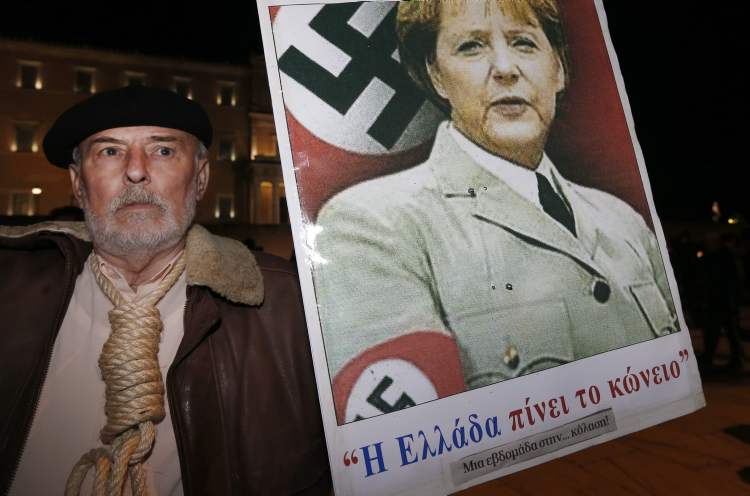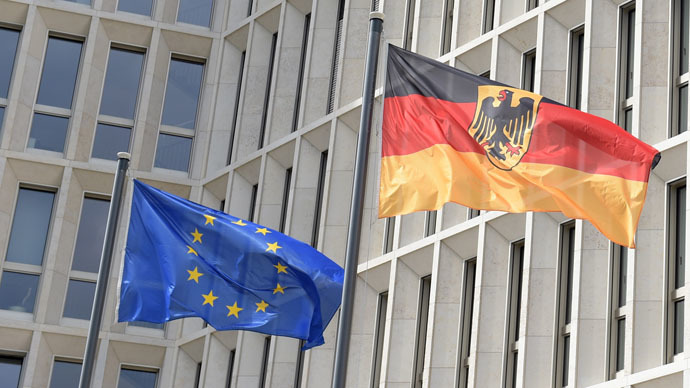Uden et seriøst forsøg på at bryde myterne, er det umuligt at få øje på, hvad der kunne tolkes som et nyt tysk forsøg på at opnå overherredømme.
Modsat den gængse myte der for tiden spredes af de amerikanske tænketanke, så er Berlin, politisk set under Forbundskansler Merkel ikke et mellemled mellem et stadigt hegemonisk USA og et "agressivt" Rusland.
Virkeligheden er, at Berlin, i det mindste i øjeblikket, hellere ville give indtryk af at synge med på Washingtons melodi - med mindre variationer - imens det revser Rusland. Dette er tilfældet, selv når vi betragter de solide energi-/handels-/forretnings- forbindelser med Moskva i og med at Tyskland importere én tredjedel af sin naturgas, og at tyske industrier/firmaer/selskaber har store investeringer i Rusland.
Modsat en anden myte, søger det politiske Berlin ikke "stabilitet" i Østeuropa, men snarere at skabe vasalstater. Den uophørlige Østeuropæiske integration i EU, ledet af Berlin, var ligeså meget en strategi til at åbne nye markeder for Tysk eksport, som et middel til at oprette en bufferzone mellem Tyskland og Rusland. Hvad de Baltiske stater angår, er de allerede vasaler: Tyskland er den største handelspartner for alle tre.
Endnu en anden myte er at Berlin ikke kan løfte - bagslagsgivende - sanktioner mod Moskva så længe som "sikkerheden" i Central- og Østeuropa ikke er sikret. Virkeligheden er at Tyskland hellere ville udøve total politisk/økonomisk kontrol over periferien af det tidligere SSSR.
Hvad EU angår, styrer Tyskland allerede politisk og økonomisk et EU, der nu er nedsunket i et post-demokratisk, ikke eligalitært, nedskæringshærget og giftigt miljø uden nogen synlige udvej.
Deutschland under kontrol?
Iblandt det nuværende intellektuelle kviksand i EU, hvor, for at citere Yeats, "de bedste mangler al overbevisning, mens de værste er fulde af lidenskabelig intensitet" - tænk på de sølle neoliberale ideologer, der gemmer sig bag behagelige stillinger i det kafkaske tempel af middelmådighed, Bruxelles - en moderne Diogenes ville være hårdt presset til at finde en informeret observatør, der kunne anskueliggøre Tysklands spil.
Derfor den undtagelse hos historikeren og antropologen Emanuel Todd, forfatter til den skelsættende 2002 essay, Efter Imperiet, som ikke viste nogen barmhjertighed i sin beskrivelse af den amerikanske tilbagegang. I et langt interview i 2014 www.les-crises.fr centreret på Tyskland, beskriver han den geopolitiske situation på en plet.
Todd er dybt bekymret over Vestens dysfunktion - som er tydeligst manifesteret ved at Europa "praktisk taget er i krig med Rusland". Han ser Vestens ængstelige sygelige "fiksering" på Rusland som en søgen efter en syndebuk, eller bedre, "skabelsen af en fjende, der er nødvendig for at opretholde en minimal sammenhæng i Vesten. Den Europæiske Union blev skabt mod SSSR. Den kan ikke undvære Rusland som en fjende."
Og dog, bag EU, er der det, som det virkeligt drejer sig om; det Tyske projekt, som Todd identificerer som et projekt om magt, med det mål "at sammenklemme efterspørgslen i Tyskland, at slavebinde de gældsplagede lande i Sydeuropa, at sætte Østeuropæerne i arbejde, at kaste nogle godbidder hen til det franske banksystem." Og dette magtprojekt kan ikke undgå at åbne den ildevarslende dør til Tysklands "umådelige potentiale for politisk irrationalitet" - et tema, der er meget fremtrædende nu med alle erindringer om Rigets fald (i forbindelse med 70 året for anden verdenskrigs afslutning).
Todd identificere det, som Lacan ville kalde det store Europæiske non-dit ("ikke udtalte"): "Nøglen til USA's kontrol med Europa som arv fra sejren i 1945 er kontrollen med Tyskland."

Kommentar: Artiklen er en delvist oversættelse af The German Question
Vi beklager, at vi ikke har nok tid til at bringe hele artiklen på dansk. Nedenunder følger resten af artiklen på engelsk, men den sidste kommentar er redigeret og oversat.
Der findes også en udmærket artikel om Emanuel Todds reflektioner om Europa i Dagbladet Information 'Europa har gjort Rusland til syndebuk' Og dog, i forhold til Kiev er støtten ikke så solid som Kiev kunne ønske:
German state TV not buying what Poroshenko is selling
Selv om Emmanuel Todd ser tegn på at Tyskland forsøger at køre sit eget løb, så er der også en anden side, der er udtryk for underkastelse og kontrol i forhold til USA:
- Efterretningsskandale bringer tysk regering i stormvejr
- Tysk regering løj om spionaftale
- Why Merkel betrays Europe and Germany
Yet now the control is dissolving, albeit chaotically, and that means "the beginning of the dissolution of the American imperium." And imperial decline - visible in myriad declinations - leads Todd to a bombshell; the real threat to the US, much more dangerous than Russia - "which is external to the empire" - is Germany.
And what about the threat to Russia from Germany? Todd strongly implies the populations of Russian language, culture and identity are being attacked in Eastern Ukraine with "the approval and support" of the European Union - which is a fact. At the same time, he interprets the Russian "silence" about it not "as in the French and the American case, a refusal to see reality," but as good diplomacy; "They need time. Their self-control, their professionalism, compels admiration." Try finding this kind of analysis in CIA-infested European corporate media.
Comment: Yes -- the Russians are working every diplomatic angle in their reach in order to stave off greater disaster in Ukraine and elsewhere. Unfortunately, they are also forced to prepare themselves for war; major war.
"Europe" out, Germany in
So what Todd is essentially gaming here is "the emergence of a new face-to-face between two great systems: the American continent-nation, and this new German empire, a political-economic empire which people continue to call 'Europe' out of habit." And yes, he's got a compelling case.
Using a political science concept coined by Belgian anthropologist Pierre van den Berghe, Todd qualifies the German system as "un-egalitarian domination"; whatever equality is left concerns only the dominant, as in German citizens. Welcome, then, to Herrenvolk democracy - the "democracy of the master people."
Todd bolsters his case by pointing to the dynamism of the German economy as based in the former USSR satellites; "Part of the success of our German neighbors stems from the fact that the communists were much interested in education. They left behind them, not only obsolete industrial systems, but also populations that were remarkably well educated."
So "annexing" the populations of Poland, Czech Republic, Slovakia, Hungary, etc, meant Germany reorganizing its industrial base using low-cost labor. But then there's a major "if"; Todd believes Germany might also "annex" an active population of 45 million in Ukraine, "with its good level of training inherited from the Soviet period."
Not only that's extremely unlikely; Moscow has been explicit this is a red line. Moreover, "Ukraine" is a failed state in terminal disintegration, now a lowly, de facto, IMF colony, whose only interest for the "West" is rich agricultural land to be plundered by Monsanto and cohorts.
"He hasn't seen Germany coming"
The fun really starts when Todd examines the mess "classical American geopoliticians of the 'European' tradition," are in. He had to be talking mostly about notorious Dr. Zbig "Grand Chessboard" Brzezinski; "Obsessed by Russia, he hasn't seen Germany coming."
Todd correctly notes how Dr. Zbig "has not seen that the American military might, by extending NATO all the way to the Baltic States, to Poland... was in fact cutting out an empire for Germany, at first economic, but at present already political." And in parallel to what I have been examining for years now, he hints that "the extension of NATO to the East could in the end bring about a version B of Brzezinski's nightmare: a reunification of Eurasia independently of the United States."
The clincher is to be savored like the best Armagnac; "Faithful to his Polish origins, he feared a Eurasia under Russian control. He is now running the risk to go down in History as another one of these absurd Poles who, out of hatred of Russia, have insured the greatness of Germany."
For the moment, political Germany - but not its industrialists - has chosen to continue to be subjugated to the US/NATO as Chancellor Merkel appears to be enforcing the encircling of Russia.

So this is how we come to another scenario circulating among what Bauman called "nomad elites of liquid modernity"; not think tanks or Western intel agencies.
According to this scenario, instead of a EU trying to work with Russia, we have Berlin trying to undermine Moscow to ultimately seize financial control of Russia's immense resources; back to those good old disaster capitalism Yeltsin days, when everything was collapsing other than Russia's natural resource production.
After all the 'New Great Game' is mostly about control of the natural gas, oil and resources of Russia and Central Asia. Will they be controlled by oligarch fronts supervised by their masters in London and New York, or by the Russian state? And once Russia had been subdued, then the Central Asian "stans", especially gas republic Turkmenistan, would also be free to do German's bidding.
But for the moment, it's all shadow play. Merkel utters platitudes about the Minsk ceasefire - when every serious player knows Kiev breaks it on an everyday basis. Berlin works backstage to keep the proverbial "reluctant players" - Italy, Greece, Hungary - on board with sanctions on Russia while spinning it's doing its best to contain hysterical Poland and Lithuania.
Merkel is very much aware the US prosecutes much of its drone war out of Germany while the BND - German intel - spies for the NSA on the French, the European Commission (EC) and even German industry.
So she will never directly antagonize Washington - as she in fact mostly fears German Atlanticists, while posing about Putin and the Kremlin living "in a different world." Berlin and Moscow continue to talk diplomatically, but the mood tends to the tone deaf.
The new exceptionalism
Todd is one of the few who at least are setting alarm bells ringing. As in this formulation: "German culture is un-egalitarian: it makes difficult the acceptance of a world of equals. When they are feeling that they are the strongest, the Germans will take very badly the refusal of the weaker to obey, a refusal which they perceive as unnatural, unreasonable."
Once again, we're in the realm of exceptionalism, but now with the added, historically troubling German penchant for political irrationality. The new, remixed lebensraum may revolve around an ever-expanding export powerhouse - adding on global trade by using educated, low-cost labor. While the Reich disintegrated in a larger than life folly seventy years ago, the new deal accomplished a dream; as Todd characterizes it, there are two great "developed industrial worlds" today, America and "this new German empire."
He sees Russia as a "secondary question" and he has not examined China's long game; thus he's not focused - as in my own case - on myriad moves toward Eurasia integration. But what he's concentrating on is no less than a thriller for the ages, a "completely different future for the twenty years to come, other than the East-West conflict;" Germany rising - and the US and Germany inevitably clashing, all over again. History may yet repeat itself as (lethal) farce after all.




Fra Frankrigs forhenværende premierminister
[Link]http://dk.sputniknews.com/politik/20150610/107379.html
"[...]
Europa har mistet sin selvstændighed. USA inddrager os i et korstog mod Rusland, der er imod Europas interesser. USA lægger pres på Tyskland, for at Tyskland skal give efter for Grækenland med det formål at finde et kompromis om Grækenland. Den tyske efterretningstjeneste udspionerer Frankrig; det sker ikke i tysk interesse, men i USA's interesse, har François Fillon udtalt i en direkte udsendelse på tv-kanalen BFMTV" [Link]http://www.bfmtv.com/mediaplayer/video/francois-fillon-face-a-jean-jacques-bourdin-en-direct-551774.html (Audio på fransk) Mere fra interviewet oversat til engelske) [Link]]http://fortruss.blogspot.dk/2015/06/former-prime-minister-of-france.html og [Link]http://rt.com/news/266362-europe-us-russia-crusade/ og [Link] http://rt.com/news/266362-europe-us-russia-crusade/
François Fillon ser altså tilsyneladende Tysklands rolle som USAs administrationskontor i det Kontinentale Europa